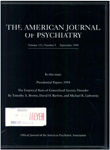Comparison of cognitive-behavioral and supportive-expressive therapy for bulimia nervosa
Abstract
OBJECTIVE: The authors compared the effectiveness of 4 months (18 sessions) of cognitive-behavioral and supportive-expressive therapy for bulimia. METHOD: Sixty patients obtained from clinical referrals to an eating disorders program who met modified DSM-III-R criteria for bulimia nervosa were randomly assigned to the two conditions. Treatments were delivered in an individual format, on an outpatient basis, by experienced therapists using treatment manuals. The primary outcome measures were self-induced vomiting, binge eating, and attitudes toward body weight and shape, which were assessed by self- report and structured interview. RESULTS: Fifty patients completed treatment, 25 in each condition. Both treatments led to significant improvements in specific eating disorder symptoms and in psychosocial disturbances. Supportive-expressive therapy was just as effective as cognitive-behavioral therapy in reducing binge eating. Where treatment differences were found, they favored cognitive-behavioral therapy. Cognitive-behavioral therapy was marginally superior in reducing the frequency of self-induced vomiting; 36% of the patients who received cognitive-behavioral therapy and 12% of those who received supportive- expressive therapy abstained from vomiting in the last month of treatment. Cognitive-behavioral therapy was significantly more effective in ameloriating disturbed attitudes toward eating and weight, depression, poor self-esteem, general psychological distress, and certain personality traits. CONCLUSIONS: These results moderately favor cognitive-behavioral therapy over supportive-expressive therapy for bulimia nervosa, but follow-up is required to determine the durability of outcome with both modalities. The findings must be interpreted with caution since the selected clinical sample in this study may not represent the bulimia nervosa population.
Access content
To read the fulltext, please use one of the options below to sign in or purchase access.- Personal login
- Institutional Login
- Sign in via OpenAthens
- Register for access
-
Please login/register if you wish to pair your device and check access availability.
Not a subscriber?
PsychiatryOnline subscription options offer access to the DSM-5 library, books, journals, CME, and patient resources. This all-in-one virtual library provides psychiatrists and mental health professionals with key resources for diagnosis, treatment, research, and professional development.
Need more help? PsychiatryOnline Customer Service may be reached by emailing [email protected] or by calling 800-368-5777 (in the U.S.) or 703-907-7322 (outside the U.S.).



